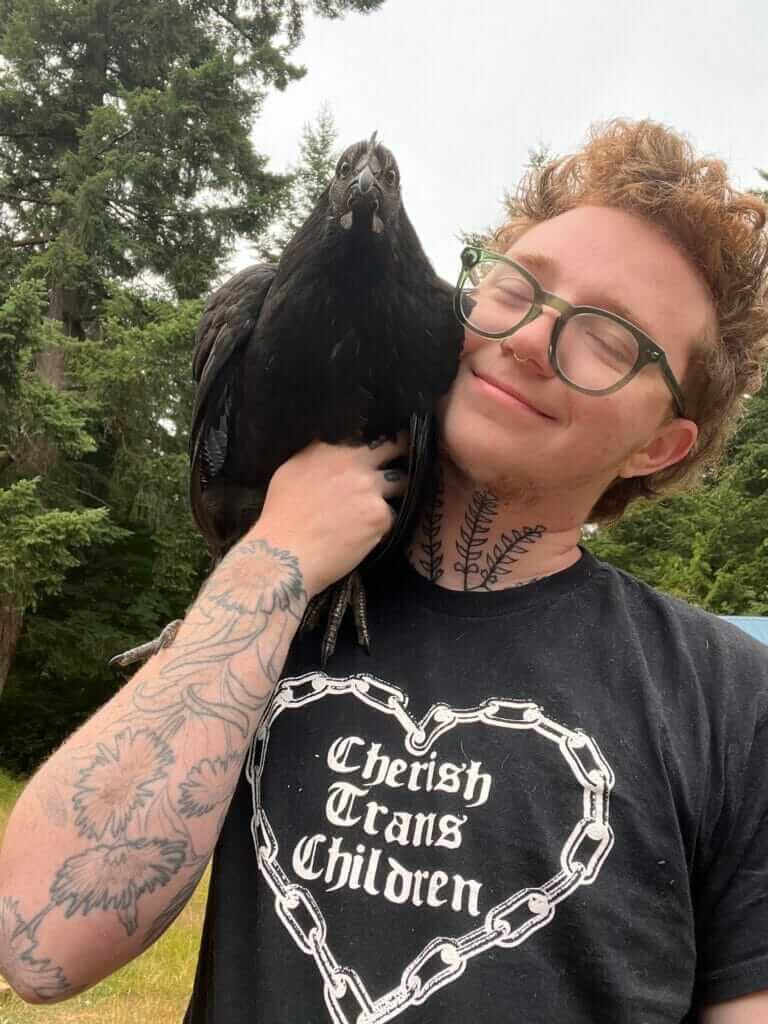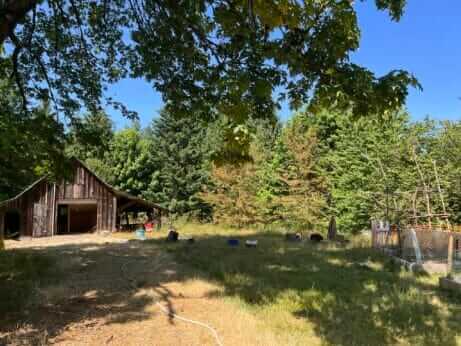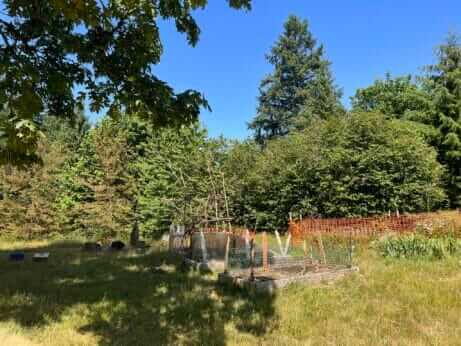In Becoming a Farmer, I Found Community and Unearthed My Trans Joy
Farming has allowed me to create a world where I finally belong.
In Becoming a Farmer, I Found Community and Unearthed My Trans Joy
Farming has allowed me to create a world where I finally belong.

by author.
Earlier this year, I put a call out for help preparing my farm for spring. More than 20 people showed up to help build chicken tractors, put up fencing, flip beds and even sift worm castings. Across the country, farmers build community through work days, food distribution, farm-to-table events and more. What makes this different is that everyone who showed up was trans, and this farming project is a place for us to organize, raise and share food and reclaim the bodily autonomy that is being taken from us.
I never set out to be a farmer. At 27, I was living with my co-parent and one-year-old child on 10 acres of land in rural Oregon. I had dreams of a little homestead operation to feed my family—a garden and maybe a few chickens for eggs. However, when I began my medical gender transition, everything I knew about family completely changed.

I grew up in a small conservative town about two hours from where I live now. My parents divorced when I was six years old, and I spent a lot of that time at my cousins’ farm where we ran wild through pasture and forest, daring each other to touch hotwire and finding portals in the branches of yew trees. I told my cousins in the privacy of those woods that sometimes I dreamt about being a boy, and when we played Oregon Trail with their Radio Flyer red wagon, I could be whatever I wanted.
After the divorce, I traveled from house to house with my mom and her various boyfriends. For a couple of years, my mom was married to a man named Tim who lived on 40 acres of farmland. I made friends with the neighbor kids, and they asked if I was interested in joining their 4H club. Together, we raised sheep, pigs and chickens. We gave our animals silly names like Lightbulb and Tofurkey, and we desperately copied the way other kids at the county fair displayed the feathers and feet of their chickens to judges.
While I loved the communal aspect of 4H and was even OK with raising animals for meat, it became increasingly hard to mask my queerness among the small-town conservative parents and children I interacted with through the club. Eventually, I told everyone in my life that I was queer and was immediately shut out from the community; my closest friend’s mom was concerned that I would “turn” her daughters gay.
I spent the majority of my late teens and early twenties living in cars and cheap studio apartments, chasing dirtbag dreams in the mountains and eating gas station burritos as a luxurious meal. Eventually, those dreams led to me being pregnant and living in a barn on a family friend’s land. We paid $500 in rent and helped maintain the property. I started a small garden that didn’t grow much more than tomatoes and snow peas. It felt like a step toward something bigger than myself, but I wasn’t sure how to contextualize it. I knew that there was no other way I was willing to raise a child than on land with forest nearby to roam, an aspect of my own childhood that I cherish immensely.
My co-parent started helping the neighbor maintain her property as well, and when that neighbor decided to move back to the city, she referred us to her landlord and we were able to rent a three-bedroom farmhouse on 10 acres for $1,500 a month. As someone who had grown up in poverty, it felt like being handed an incomprehensible gift.
Two months after we moved in, I started my medical gender transition. Once I was living my life fully out as a trans masculine person, everything I valued started to shift. I started living in my own body. It made me love and care for my kid more than ever before, and my co-parent and I realized we needed to rethink the dynamics of our family. For us, this meant that they would move out to live and work in the city and I would stay on the farm.
I was able to find roommates to move in to help with rent, both of whom are trans and queer. I started expanding my own relationships through polyamory and realized the importance for me of dating other trans people.

As I started to see this community coming together out in the country, I realized that it could be possible to provide food for other trans people. I had spent so much of my life diminishing my own goals, thinking that I was always dreaming big and could never really execute those ideas. When I had my own space to daydream about what I could create, I started thinking through the steps to getting there and soon realized I had the capacity and support to dive in.
The initial goal was to create a small-scale, biodynamic farm that focused on utilizing animals in the garden. As I started to learn more, I found that raising rabbits for meat was a highly economical and easy way to produce meat on a small scale. I bought chickens and ducks from a queer friend who runs a small chick business for eggs, and before I realized it, I had a full operation on my hands. My friends and I came up with a name—Phototaxis Farming Project—that encapsulated the trans and moth-like experience of aiming beyond the light. We started a GoFundMe to help with initial farm costs, and I was amazed how many people were excited to see this project happening.
Since then, my goal has evolved and gotten even more specific. I want to feed other trans people, especially those who (like many of us) have faced food insecurity their entire lives. Trans people are three times as likely to go hungry than cis people, and that statistic only increases for trans people of color. With government food subsidy programs such as WIC (Special Supplemental Nutrition Program for Women, Infants, and Children) and Food Stamps, there are restrictions on what kind of food benefits can be used for—often limited to mass-produced generic brands that are more packed with filler ingredients than actual, nutritious food.
Many farmers markets have programs where you can exchange food stamps for tokens to use with selected vendors, but even farmers markets are inaccessible to many people with disabilities (a significant intersection for trans people), families to take care of, weekend jobs and feeling unsafe in the predominantly white, wealthy spaces where farmers markets tend to be. My mission is to provide free and accessible food for the trans community. If this project continues to expand, I see a future where we can offer collective housing and work opportunities for trans people as well.
Producing and preparing food can be central to building community, and it’s been the driver of our trans community. When we processed our first ducks, we shared the meal with queer and trans friends who were there to help with preparing the farm for spring. I made duck soup—most of us had never even eaten duck before—and we were all overjoyed with trying something new on the same land on which it was raised.
A few weeks ago, we processed the first litter of meat rabbits. My partner Lamby and I were unsure how it would feel, after having processed the ducks together and still feeling the emotional toll of taking the life of an animal. I asked my friends who run a small rabbitry in Portland if they would be willing to come out and help us. The experience ended up being pure magic. To learn such a specific skill from other trans farmers and to be in the presence of people with the same goals of radicalizing farming felt like the work of our trans ancestors bringing us together. This week we are learning how to process the pelts from another trans farmer, and this weekend, we will be celebrating trans joy and sharing our first harvest with as many trans people as we can fit on the property.
It’s hard out there to be trans, especially with the increase in trans violence and anti-trans legislation. We are actively having our bodily autonomy and sovereignty taken from us. But farming is inherently radical, and to be able to bring something so essential such as high-quality, fresh, loved and cared for food to this community feels like something I have to do.
I never set out to be a farmer, but farming has opened the door to creating a community where I do belong. Yesterday, I walked through the farm with chickens following at my heels and fresh eggs in my hands. I ran and the chickens ran with me, I danced in the anticipation of the rain. The project, this land and this community I have had a part in building has brought me to a place of joy that I didn’t know could exist—and that’s just it: This passion project makes me want to exist.
Follow us

This work is licensed under a Creative Commons Attribution-NoDerivatives 4.0 International License.
Want to republish a Modern Farmer story?
We are happy for Modern Farmer stories to be shared, and encourage you to republish our articles for your audience. When doing so, we ask that you follow these guidelines:
Please credit us and our writers
For the author byline, please use “Author Name, Modern Farmer.” At the top of our stories, if on the web, please include this text and link: “This story was originally published by Modern Farmer.”
Please make sure to include a link back to either our home page or the article URL.
At the bottom of the story, please include the following text:
“Modern Farmer is a nonprofit initiative dedicated to raising awareness and catalyzing action at the intersection of food, agriculture, and society. Read more at <link>Modern Farmer</link>.”
Use our widget
We’d like to be able to track our stories, so we ask that if you republish our content, you do so using our widget (located on the left hand side of the article). The HTML code has a built-in tracker that tells us the data and domain where the story was published, as well as view counts.
Check the image requirements
It’s your responsibility to confirm you're licensed to republish images in our articles. Some images, such as those from commercial providers, don't allow their images to be republished without permission or payment. Copyright terms are generally listed in the image caption and attribution. You are welcome to omit our images or substitute with your own. Charts and interactive graphics follow the same rules.
Don’t change too much. Or, ask us first.
Articles must be republished in their entirety. It’s okay to change references to time (“today” to “yesterday”) or location (“Iowa City, IA” to “here”). But please keep everything else the same.
If you feel strongly that a more material edit needs to be made, get in touch with us at [email protected]. We’re happy to discuss it with the original author, but we must have prior approval for changes before publication.
Special cases
Extracts. You may run the first few lines or paragraphs of the article and then say: “Read the full article at Modern Farmer” with a link back to the original article.
Quotes. You may quote authors provided you include a link back to the article URL.
Translations. These require writer approval. To inquire about translation of a Modern Farmer article, contact us at [email protected]
Signed consent / copyright release forms. These are not required, provided you are following these guidelines.
Print. Articles can be republished in print under these same rules, with the exception that you do not need to include the links.
Tag us
When sharing the story on social media, please tag us using the following: - Twitter (@ModFarm) - Facebook (@ModernFarmerMedia) - Instagram (@modfarm)
Use our content respectfully
Modern Farmer is a nonprofit and as such we share our content for free and in good faith in order to reach new audiences. Respectfully,
No selling ads against our stories. It’s okay to put our stories on pages with ads.
Don’t republish our material wholesale, or automatically; you need to select stories to be republished individually.
You have no rights to sell, license, syndicate, or otherwise represent yourself as the authorized owner of our material to any third parties. This means that you cannot actively publish or submit our work for syndication to third party platforms or apps like Apple News or Google News. We understand that publishers cannot fully control when certain third parties automatically summarize or crawl content from publishers’ own sites.
Keep in touch
We want to hear from you if you love Modern Farmer content, have a collaboration idea, or anything else to share. As a nonprofit outlet, we work in service of our community and are always open to comments, feedback, and ideas. Contact us at [email protected].by Sage Agee, Modern Farmer
July 21, 2023
Modern Farmer Weekly
Solutions Hub
Innovations, ideas and inspiration. Actionable solutions for a resilient food system.
ExploreExplore other topics
Share With Us
We want to hear from Modern Farmer readers who have thoughtful commentary, actionable solutions, or helpful ideas to share.
SubmitNecessary cookies are absolutely essential for the website to function properly. This category only includes cookies that ensures basic functionalities and security features of the website. These cookies do not store any personal information.
Any cookies that may not be particularly necessary for the website to function and are used specifically to collect user personal data via analytics, ads, other embedded contents are termed as non-necessary cookies.
My heart is full after reading this- your passion is contagious. I hope you know that the majority of us want your success and support your goals. Ignore the haters. I’m glad you’re sharing your journey and saving a space at the table for any one that asks.
As a fellow trans person it is always comforting to hear about the lives of other people like myself. Trans people can be found in every corner of the world, and have existed for as long as people have drawn breath. We have survived this long because of our resiliance, but also because of community! It has been a joy watching Phototaxis Farming Project grow, and I can’t wait to see where it goes from here! Good job, Sage!
This was a meaningful article and I appreciate his authenticity and willingness to be vulnerable to the world about his experience in becoming the farmer he is. Thank you!
I loved this article!! I’m so glad he found his farm and his calling, many people never find their calling. And I so agree, farmers markets can be kind of intimidating, everyone seems so upper middle class. I’m white and cis gendered and I find them intimidating at times, probably because I’ve used food stamps.
And I thought my sisters and I were the only ones who said we would name one of our kids Lightbulb!! We also grew up running through the woods and fields on our parents small farm in Washington state. Thanks again for this article.
Great article. Thanks for sharing. Building resilience through food security is going to matter in a big way when the industrial consumer society hits bumps in the road as it comes up against planetary limits. Great to hear you are creating a safe space for community and food sovereignty. 😀
Thank you for sharing your journey. I am on the same path later in life. It’s extremely hard to transition from living in the city to living rural below minimum wage.
Thank you for sharing your story and for inspiring others.